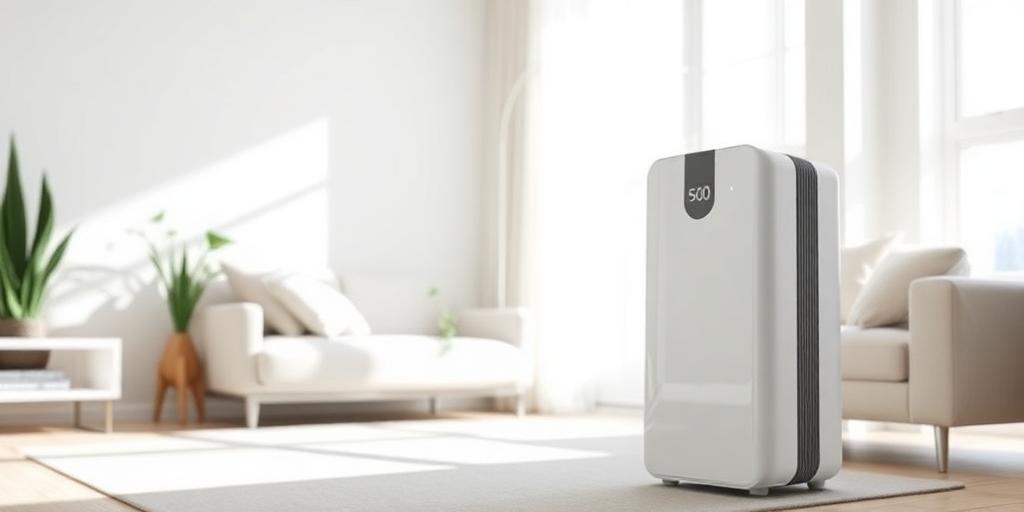In an era where indoor air quality is increasingly recognized as a critical component of overall well-being, selecting the right air purifier for your home is no longer a luxury but a fundamental consideration. Our homes, often perceived as sanctuaries, can harbor a surprising array of pollutants, from pet dander and dust mites to volatile organic compounds (VOCs) and allergens. This authoritative guide will equip you with the essential knowledge to navigate the market and invest in the optimal air purification solution for your living space.
Understanding the Imperative: Why Indoor Air Quality Matters
The air inside your home can be significantly more polluted than the air outside. Factors such as inadequate ventilation, household cleaning products, cooking fumes, mold spores, and particulate matter from outdoor sources contribute to a complex cocktail of airborne contaminants. Prolonged exposure to these pollutants can exacerbate allergies, trigger asthma attacks, and potentially lead to more severe respiratory and cardiovascular issues. Implementing an effective air purification system is a proactive step toward mitigating these risks and fostering a healthier indoor environment.
Key Features to Prioritize in an Air Purifier
When evaluating the market for the best air purifiers for your home, several critical specifications demand attention. Understanding these will enable an informed decision tailored to your specific needs.
- CADR (Clean Air Delivery Rate): This metric indicates how quickly an air purifier removes pollutants from a room. Measured in cubic feet per minute (CFM), CADR values are typically provided for smoke, dust, and pollen. A higher CADR signifies faster purification for a given room size. When looking for a top-rated home air purifier, always match its CADR to your room's square footage.
- Filtration System: The efficacy of an air purifier hinges on its filters.
- HEPA Filters: A true HEPA (High-Efficiency Particulate Air) filter is paramount, capable of capturing at least 99.97% of airborne particles as small as 0.3 microns. This includes dust, pollen, pet dander, mold spores, and some bacteria. Understanding HEPA air purifiers explained makes it clear why they are non-negotiable for superior particle removal.
- Activated Carbon Filters: Essential for addressing odors and gaseous pollutants like VOCs from paint, cleaning products, and cooking. While HEPA targets particulates, activated carbon tackles the chemical components of indoor air.
- Pre-filters: These capture larger particles, extending the life of the more expensive HEPA and carbon filters.
- Room Size Coverage: Purifiers are designed for specific room dimensions. Ensure the model you select is rated for the square footage of the area you intend to purify, ideally with some margin to ensure optimal performance. This is crucial for maximizing the benefits of home air purifiers.
- Noise Level: Measured in decibels (dB), noise output is a significant factor, especially for purifiers intended for bedrooms or quiet living areas. Look for models with lower dB ratings, particularly on their lowest settings.
- Smart Features and Connectivity: Modern air purifiers often include Wi-Fi connectivity, app control, air quality sensors, automatic modes (which adjust fan speed based on detected pollution levels), and filter replacement indicators. These features enhance convenience and optimize performance.
- Energy Efficiency: Look for ENERGY STAR certified models to ensure lower operating costs and reduced environmental impact.
Selecting the Optimal Air Purifier: A Buying Guide
Rather than endorsing specific models which can quickly become outdated, we focus on the characteristics that define the best air purifiers for different scenarios:
- For Allergy and Asthma Sufferers: Prioritize units with robust True HEPA filtration and a high CADR for pollen and dust. Additional activated carbon can help with irritants from VOCs. Look for models with sealed systems to prevent leakage of unfiltered air. This is a key aspect of finding the best air purifiers for allergies.
- For Pet Owners: A combination of True HEPA for dander and an ample activated carbon filter for pet odors is essential. Consider units with a pre-filter to capture larger pet hairs, extending the life of subsequent filters.
- For Large Open Spaces: Focus on purifiers with a very high CADR and a broad room coverage rating. Multiple smaller units strategically placed can sometimes outperform a single large unit in very expansive, open-plan areas.
- For Smaller Rooms/Bedrooms: Noise level becomes a primary concern here. Seek models with low decibel ratings on their quietest settings, alongside adequate CADR for the room size. Smart features like a "sleep mode" can be beneficial.
- For General Household Use & Budget-Conscious Buyers: Look for a reliable brand offering True HEPA and activated carbon filtration. While advanced smart features might be omitted, core performance should not be compromised. Several reputable manufacturers offer entry-level models that still deliver effective purification.
Maintenance: Sustaining Peak Performance
Regular maintenance is crucial for an air purifier's longevity and effectiveness. This primarily involves:
- Filter Replacement: Adhere strictly to the manufacturer's recommended schedule for replacing HEPA and activated carbon filters. Neglecting this will significantly reduce the unit's efficacy and can put a strain on the motor.
- Pre-filter Cleaning: Most pre-filters are washable or easily vacuumed. Clean these frequently to prevent buildup and maintain optimal airflow.
Conclusion: Investing in Your Indoor Health
Investing in one of the best air purifiers for your home is an investment in your health and comfort. By understanding the critical features, prioritizing essential filtration technologies like True HEPA and activated carbon, and matching the unit's capacity to your living space, you can confidently select a device that provides consistently cleaner, healthier air. Make an informed choice and breathe easier, knowing you've taken a significant step toward optimizing your home's indoor environment.









